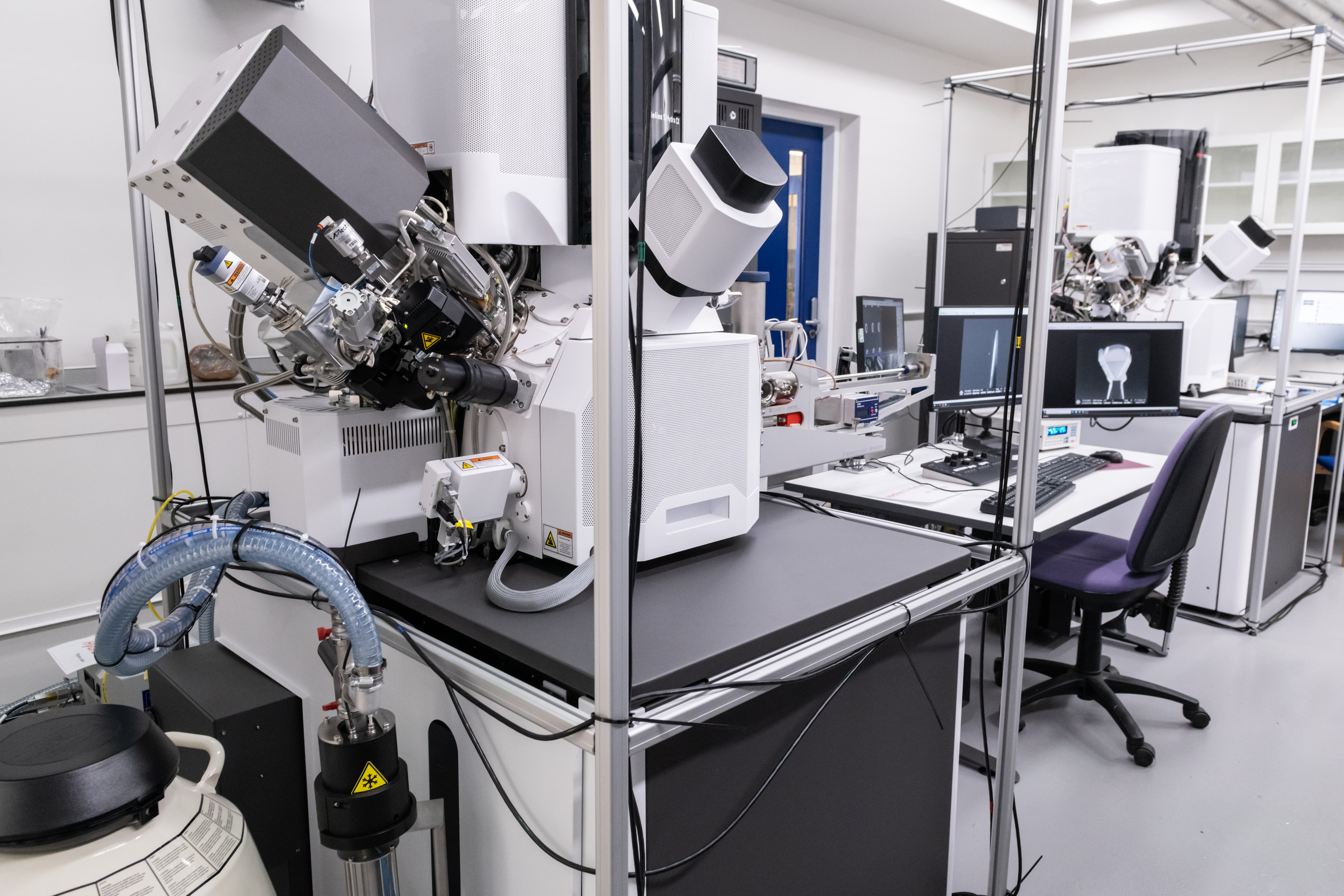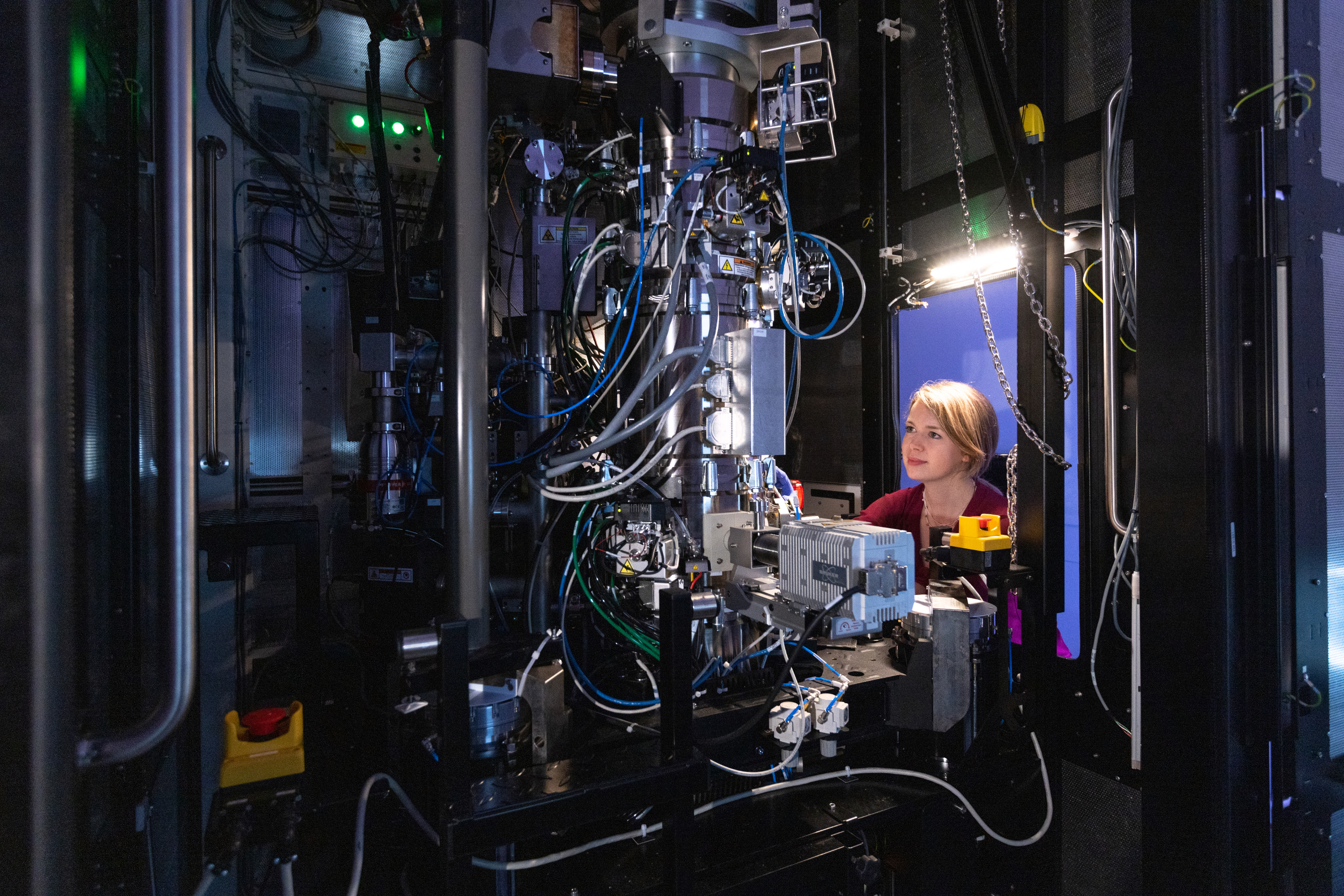Facilities
 The Local Electrode Atom Probe (LEAP 5000) allows nanoscale analysis of typical volumes of 50 nm x 50 nm x 100 nm with ppm compositional sensitivity and up to 0.2 nm spatial resolution in the analysis direction.
The Local Electrode Atom Probe (LEAP 5000) allows nanoscale analysis of typical volumes of 50 nm x 50 nm x 100 nm with ppm compositional sensitivity and up to 0.2 nm spatial resolution in the analysis direction.
It is equipped with a high-frequency laser pulsing system to analyse non-conductive materials and insulators and an energy-compensating lens for optimal mass-resolving power. Atom probe microscopy can detect all elements equally (including hydrogen) and allows 3D reconstructions of nanoscale segregation within sample volumes.
The LEAP 5000XR is fitted with a FerroVac cryo/vacuum transfer suitcase, which can dock directly with the Hydra DualBeam and the glovebox for the movement of environmentally sensitive samples.

The TFS Helios Hydra PFIB with cryo-stage combines a multi-source plasma column (Xe, N, O, Ar) with a high-resolution electron column with insertable backscatter and STEM detectors.
The high current plasma source allows high-volume milling at rates orders of magnitude greater than that of conventional gallium sources, giving significant improvements in throughput. The system is equipped with a cryo-capable stage and cryo manipulator, which will allow the lift out of materials that require a constant cryogenic temperature, such as frozen liquid/solid interfaces.
The Hydra is fitted with a FerroVac cryo/vacuum transfer suitcase, which can dock directly with the LEAP 5000XR and the glovebox for the movement of environmentally sensitive samples.
 The glovebox system consists of a chamber with an inert (N2) atmosphere, a large load-lock for large samples and materials and a dock for a FerroVac cryo/vacuum transfer suitcase.
The glovebox system consists of a chamber with an inert (N2) atmosphere, a large load-lock for large samples and materials and a dock for a FerroVac cryo/vacuum transfer suitcase.
This allows mounting materials for analysis and FIB, atom probe and TEM sample holders for subsequent transfer into their respective instruments using the FerroVac suitcase or other suitable method.
If required, these inert gas operations can be carried out at cryo and room temperatures.

Details about the Spectra 300 Scanning Transmission Electron Microscope X-FEG/UltiMono can be found below.
Access to atomic information: The Department of Materials Spectra 300 is a probe-corrected Scanning Transmission Electron Microscope (TEM), equipped with an ultra-high-resolution X-FEG Ulti-monochromator. The ultimate STEM spatial resolution is 50 pm @300 kV, allowing users to observe even slit shifts in atomic positions within unit cells, such as the octahedral tilting of oxides.
Atomic resolution elemental analysis: The Spectra TEM is equipped with a Dual-X energy dispersive X-ray (EDX) detector and an in-situ Gatan Continuum K3 (80-300 kV) with switchable FXUP camera for lower kV experiments (60-300 kV).
The X-FEG/Mono can be automatically tuned from 1 eV down to 0.2 eV, while the X-FEG/UltiMono can be automatically tuned from 1 eV down to <30 meV, allowing for the measurement of local bandgap changes within material interfaces.
Electron diffraction: The Spectra TEM has been set up for 4D-STEM using either the Ceta camera or the K3 direct electron detector. Lorentz mode STEM alignments allow users to conduct electron diffraction experiments also within a ‘field free’ environment that is essential for most magnetic samples. The Nanomegas additional equipment and software can be used for precision electron diffraction experiments.
Cryogenic and In-situ TEM Holders: Several cryogenic and in-situ related TEM holders are part of the suite, including Gatan Liquid nitrogen (LN2) Cryogenic transfer single tilt, Gatan double tilt LN2 holder, Melbuild LN2 Cooling, Double Tilt and Vacuum Transfer TEM holder, in-situ DENSsolutions cooling and biasing holder, in-situ DENSsolutions Stream liquid and biasing or heating holder, in-situ Protochips heating and biasing holder.

Facility Managers
-
Dr James Owen Douglas
/prod01/channel_3/media/migration/faculty-of-engineering/james-douglas-high-quality_1629720014640_x4.jpg)
Location
Department of Materials
Royal School of Mines
Lower Ground Floor, LGM 05KSupport with
Atom Probe tomography
General queries about Atom Probe Tomography and associated sample preparation.
Cameca LEAP 5000 XR. -
Dr Catriona McGilvery
/prod01/channel_3/media/migration/faculty-of-engineering/Dr-Catriona-MC-Gilverny-005-(-May-14)-(0)--tojpeg_1499947101245_x4-1.jpg)
Location
Department of Materials
Royal School of Mines
Lower Ground Floor, LGM 05KSupport with
ELECTRON MICROSCOPY
Contact details
 The facility currently does not external access in place.
The facility currently does not external access in place.
For internal inquiries using the facility, please contact Professor Finn Giuliani for an initial discussion.